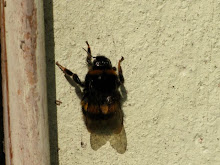Having written about the bee programme on the BBC (last post). Another even better one popped up last night on TV. It's a documentary following a British beekeeper's journey to Nepal to take part in the annual local wild honey collection.
This is an amazing programme - the stars are the bees, of course. These giant honey bees (Apis Laboriosa -twice the size of ours) build their hives high up on the side of cliffs, and the hives are enormous! The wild honey hunters have to climb down rope ladders to get at the honey comb while being attacked by millions of angry bees. It is destructive up to a point, but as with these old traditional practices they are wise enough to take just enough as not to affect the overall population of the bees. The honey is supposed to be very good. I just to have to take their word for it.
If you want to see it go to the BBC web site and look for it among the i-player programmes. It is a must for all bee lovers. BBC TV at it's best. Here is a link
http://www.bbc.co.uk/iplayer/episode/b00d298z/Jimmy_and_the_Wild_Honey_Hunters/






